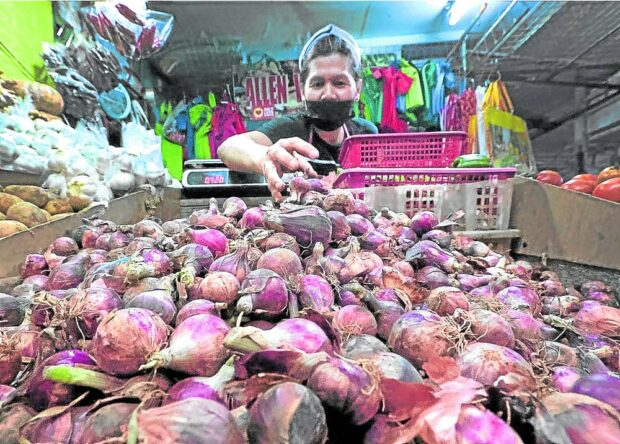Quimbo: Cartels exploit farmers to rule onion industry

PRICEY FOOD INGREDIENT The price of onions in public markets reached as high as P600 per kilogram last year. The government hopes prices will not spike again this year. —INQUIRER FILE PHOTO
MANILA, Philippines — Cartels can hoard onions and manipulate prices by taking advantage of farmers and forcing them to give up their produce at lower prices — either by claiming that imported onions are cheaper or by artificially filling up cold storage facilities.
Marikina 2nd District Rep. Stella Quimbo made such an assessment in a press briefing on Thursday, a day after the House committee on agriculture and food conducted its ninth hearing on rising onion prices.
Quimbo explained that since onion farmers would need cold storage to keep harvested onions fresh, traders who are conniving with cold storage operators would falsely claim that slots are already filled up.
Traders would then urge farmers to sell their produce at lower farm gate prices, as it would be better to earn from the onions than to leave them spoiled due to the lack of cold storage rooms.
“First, they target the local farmers. Babaratin ang mga magsasaka sa farm gate sa dalawang paraan. Una, gagamitin na dahilan ang kakulangan ng cold storage dahil wala namang access sa cold storage ang mga magsasaka. ‘Ibenta mo na sa amin yan sa 12 pesos kada kilo kundi mabubulok lang yan. Wala ka naman cold storage na mapaglalagyan ng ani mo,’” Quimbo said.
Article continues after this advertisement(First, they target the local farmers. They would buy at very low farm gate prices in two ways: First, they would use the shortage in cold storage as an excuse because farmers do not have their own cold storage. They will say, ‘Sell us your produce at P12 per kilogram, or else it will rot. You do not have any cold storage place to store your harvest.’)
Article continues after this advertisement“No choice ang maliit na magsasaka. Kaya’t pwersado syang ibenta nang mura. Ang katotohanan: Hindi pala ubos ang cold storage space. Pero dahil ang cartel ang may-ari ng cold storage, kaya nilang sabihin na puno na pag nagtatanong ang magsasaka,” she added.
(Small farmers have no choice. That’s why they are forced to sell it at a low price. But the truth is that cold storages are not full, but since cartels own these facilities, they can say they have a total capacity when farmers ask for availability.)
The lawmaker also said there are cases where the storage facilities are already reserving spaces for other big cold storage to ensure that farmers cannot deposit their onions anywhere.
READ: DA seeks help of local gov’ts to monitor cold storage facilities
READ: Quimbo says connivance, cartel behind recent skyrocketing prices of onions
Quimbo said the second way is by cornering the importation of onions, which would force farmers to give up their goods for lower prices again instead of letting traders rely on imports.
With the traders — or the cartel — having control over a huge supply of onions, prices would rise sharply under the law of supply and demand. The cartels can then make onion deliveries using their trucking companies, selling these for higher prices despite obtaining them at a lower cost.
“‘Pag karamihan ng imports ay kanila, pwede rin nilang gamitin na bargaining leverage ito laban sa local supplier. Ang sasabihin nila: ‘Ibenta mo na sa akin ng 12 pesos kada kilo, kasi landed cost ko, halimbawa mula China, ay 14 pesos lamang’. Kinalaunan, nakuha na nila ang karamihan ng imported, pati na rin ang local supply,” Quimbo said.
(When many of the imports are obtained by cartels, they can also use this as bargaining leverage against local suppliers. They would say, ‘Sell it to me at P12 per kilogram, because the landed cost from, for example, China, is only at P14 per kilogram’. Eventually, they will get most of the imported and local supplies.)
“At dahil puno na ang network ng cold storage at meron din silang network ng retail outlets, gagamitin nila ang sariling mga truck para makapag deliver ng stocks kung kelan nila gusto, kung saan nila gusto magbenta, kung kaninong tindahan nila gustong magbenta, at ididikta ang presyo na gugustuhin nila,” she added.
(And because cold storages are full and have a network of retail outlets, they will use their own trucks to deliver stocks whenever they want, and wherever they want, and to whichever store they want to sell, at prices that they dictate.)
Earlier in the press briefing, Quimbo alleged that Phil Vieva Corporation, founder Lilia “Leah” Cruz, is the country’s undisputed ‘sibuyas’ queen.
She said Cruz still controls the country’s onion cartel despite claiming she had already left the industry.
Cruz denied the accusations in one of the House panel’s hearings, saying the claims against her are “false, baseless and unfounded.”
READ: Agri trader slams ‘false, baseless, unfounded’ accusations of onion, garlic smuggling
The House panel has conducted at least eight hearings to uncover why agricultural products, mainly onions, became too expensive in the latter part of 2022.
After nine hearings, the panel is contemplating whether or not they still need to obtain more information to develop a committee report.